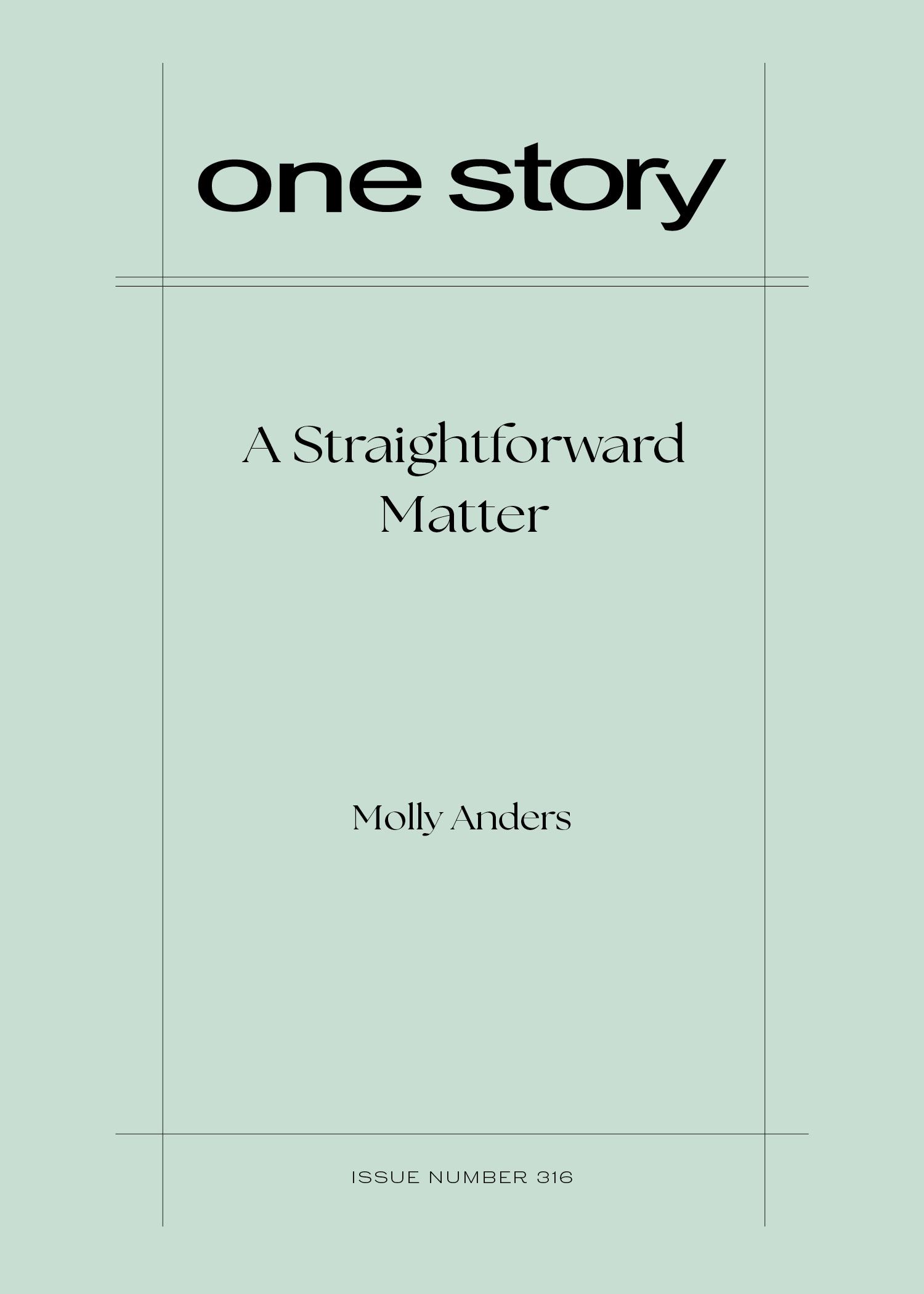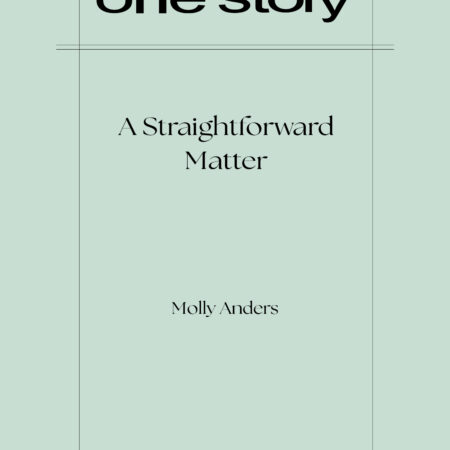
A Straightforward Matter
$2.50
336 in stock
Excerpt
Every other Wednesday—for almost as long as they were married, come to think of it—you could find me sitting in their kitchen losing money.
Bridge is a game for couples and I was alone, so Lily always got one of her friends to come play on my team. One time she brought her cousin, a diabetic young woman named Mary. Mary was nice. Lily was always trying to play matchmaker, I guess because it’s easier to keep up a regular game with another couple, but this was not the case with Mary. With Mary, I learned later, she had only wanted me to play bridge. And yet Mary was the only one Lily brought me that I fucked. By the time this became clear to me, it was too late. That’s me: always figuring things out too late.
In fact, on that same night, the night I met Mary, I was late getting to the house because of a car accident. No big deal. Or maybe it was. The truth is I panicked and fled the scene.
Read the rest now for just $0.99 with a digital subscription!
Molly Anders
Molly Anders is a writer from Kentucky. Her fiction has appeared in or is forthcoming from Ploughshares, The Stinging Fly, Passages North, North American Review, and elsewhere, and she has received support or recognition from the Fine Arts Work Center in Provincetown, the J. William Fulbright Commission, and others. She holds an MFA from Syracuse University, where she was awarded the Joyce Carol Oates Fiction Prize.
Will Allison on “A Straightforward Matter”
The narrator of Molly Anders’s “A Straightforward Matter” has a confession to make, or rather, two of them. On the way to play bridge with his friends Lily and George, already “dazzled on gin,” he causes a car accident and flees the scene. And then later that night, despite sort of knowing better, he sleeps with Lily’s cousin Mary, who turns out to be sixteen.
Some men might be ashamed of such behavior, and others might brag, but our narrator is a curious, reflective sort who seems only to want to understand what happened and why, with as much self-awareness as he can muster.
In other words, he is exactly the sort of character Ms. Anders is drawn to, “people who are morally repulsive maybe, entitled, self-loathing, destructive, whatever, but also in some way tenacious about continuing to exist in the world, even if it means bending over backwards to maintain their delusions.”
The question, then, is whether our (anti) hero will achieve the clarity he’s striving for or fall prey to his delusions. Anders’s incisive prose and psychologically complex characterization make this question trickier than you might expect. I for one found myself alternately attracted to and repelled by the narrator. I also laughed a lot, perhaps at inappropriate times. Which is to say, the story made me squirm in the way that only the most challenging, nuanced storytelling can. I hope you love it as much as I do.
Q&A by Will Allison
- WA: What first inspired you to start writing “A Straightforward Matter”?
- MA: I wrote the opening pages as part of an automatic writing exercise, then the document ended up in a scraps folder. Years later I was looking for something half-decent to start from and found it. I didn't think, "Oh, this is pretty good," so much as "Oh, I know what happens next."
- WA: What was the hardest part of writing this story?
- MA: I kept wanting to introduce new elements of danger into the story, so I think the hardest part was resisting the temptation to keep making awful things happen to these people.
- WA: The narrator of “A Straightforward Matter” confesses to leaving the scene of a car accident and having sex with a minor—things most people might keep to themselves. Could you talk about the confessional nature of this story?
- MA: I always come back to this style of storytelling. It sounds weird, but I think it's because I was raised in the recovery community—my earliest memories are crawling around under the tables at Alcoholics Anonymous and Narcotics Anonymous meetings, hanging out in the back rooms of smoky church basements while the people at these meetings sat around a table turning themselves inside out for one another. Many of them had done really awful things or had awful things done to them, but there they were, in this place where, at least for a few minutes, forgiveness or at least a suspension of judgment was just a feature of the room, like an ashtray or a roll of toilet paper. It wasn't like anybody felt better after sharing, so much as their stories became exalted and joined this higher realm, apart from them. Maybe it's just vulnerability that does that. I definitely believe the Susan Sontag thing, that when two people are being really human with each other, it emits a kind of intelligence. I guess I'm trying to capture that with one voice, one character telling a story.
- WA: Following up on the last question: some readers might find the narrator to be, well, not such a great guy. Do you think it’s important that readers like the main character of a story?
- MA: I think I have to like him, but readers definitely don't have to.
- WA: “A Straightforward Matter” reminded me of Denis Johnson’s stories, and I’ve read that he influenced your work. Could you talk about how that influence is reflected in this particular story?
- MA: Thank you for saying it reminded you of Denis Johnson. Honestly, when I read Denis Johnson for the first time, it changed my writing, mostly because I didn't know that the kind of writing I wanted to do—my version of the confessional style you mentioned above—was allowed. His fiction gave me permission to write the characters I'm interested in, people who are morally repulsive maybe, entitled, self-loathing, destructive, whatever, but also in some way tenacious about continuing to exist in the world, even if it means bending over backwards to maintain their delusions. In that way, I think the "moral" of this story is a very Denis Johnson funhouse mirror moral: "Everything's going to work out because you're so special and God loves you!"
- WA: Why did you choose not to use quotation marks for the dialogue in this story?
- MA: Quotation marks just seemed fussy in this story. It has never occurred to me in a story before to not use them.
- WA: Are any of the characters in this story based on real people?
- MA: Ah, peripherally. My father was a cop for a while when I was a kid, so George is somewhat based on him. My father would get drunk, take off all his clothes, and drive around in his patrol car with his gun. He did this multiple times, and a few times he even got pulled over and taken to the drunk tank. You'd think it would be enough to fire him, but...cops. When I was working on this story in 2020, there was a snowstorm where he was living, in East Tennessee, and after drinking too much, he took off all his clothes, wandered into a room where the ceiling had collapsed, and froze to death. Him dying didn't change the story—it was mostly done by then—but it's more important to me now that he's in it.
- WA: How long did it take you to complete “A Straightforward Matter”?
- MA: Gosh, from finding the scraps to the (truly incredible) changes you and Patrick teased out, probably seven years.
- WA: What are you working on now?
- MA: I'm working on a collection of stories—similarly morally questionable voices—and a novel about a woman who pursues a romantic relationship with a bridge. I'm also helping to translate and edit the biography of two of the earliest Lutheran missionaries to China, as a gift to my partner's grandfather, who is the grandson of the subjects. I blame that project for any vaguely religious language in this interview, namely using words like “exalted.”
- WA: What is the best bit of writing advice you’ve ever received?
- MA: I guess I respond well to negative reinforcement. My first-year undergrad workshop professor was going over a (bad) story with me after class one day and said, "Not everyone is meant to be a writer. What are you, a dance major?" It wasn't really advice, but it pissed me off and taught me that it's nice sometimes to be motivated by rage and vengeance.
